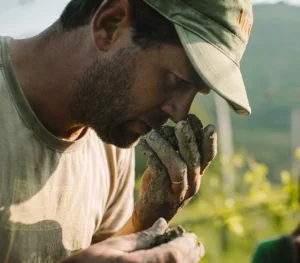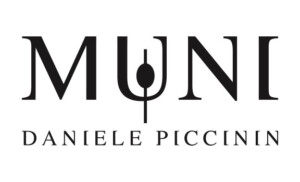Daniele Piccinin

Daniele Piccinin
About
Owner & winemaker: Daniele Piccinin
Vineyards: 7ha
Vineyard management: Certified organic with biodynamic practices and minimal copper & sulfur use
Soils: Calcareous clay
Grapes grown: Durella, Chardonnay, Pinot Noir, Pinot Grigio
Annual production: 60,000 bottles
Quick facts:
- Daniele is a champion of the rare local grape Durella, which is known for its extremely high acidity. His Durella vineyards are planted via selection massale so he can select the plants best adapted to his specific sites.
- “I consider myself a fortunate man to be able to live on what makes me happy. Transforming a bunch of grapes into wine is truly a gesture of love.” – Daniele Piccinin
If you ever make it to the hills around San Giovanni Ilarione in springtime, you’ll have no problem spotting Daniele Piccinin’s vineyards. While many vineyards in the Veneto are barren stretches of monocultural plantings kept carefully in line with copious chemical applications, the native grasses and flowers flourishing between the rows of Daniele’s vines stand out like a verdant oasis of biodiversity. There’s an energy and a life there that you can taste in every sip of his wines.
Daniele began the project in 2006 after a career in restaurants. “Before that, I didn’t have any land or any vineyards, which means I was able to start from zero,” he explains. “From the beginning, I adopted a natural approach to viticulture, guided by the conviction that the land of my ancestors was perfect for the project I had in mind.” He credits his colleagues in VinNatur for helping him find answers to his infinite questions at the beginning. Today, he is vice president of the organization.
His vineyards are planted in the “alta collina” zone, or “high hills,” between 300 and 600m of elevation. The soils are primarily limestone: “I love making wine on calcareous soils because it makes the wines very elegant,” Daniele tells us. This high in the hills, there are fewer other vineyards–instead, his vines are surrounded by natural woodlands, meadows, and pastures. The steep slopes mean that almost all vineyard work needs to be done by hand. Daniele and his team spend 600 working hours per hectare during the growing season to produce healthy fruit with a minimal impact on the environment. During our last visit, the pride in his voice was evident when he told us that his neighbors prefer to buy wines from him these days: living with vineyards in their backyards, they’re acutely aware of how many chemical sprays are used on most plantings, and how different things are where Daniele farms.
In the cellar, the primary goal is to allow the healthy, ripe fruit they’ve farmed so carefully to express itself. “For me, a natural wine must express the variety and the soil it belongs to first and foremost, and then everything else,” Daniele asserts. “In my point of view, any defect is a detriment to that quality. I can’t call myself a non-interventionist–I’m actually extremely vigilant during harvest. I worry about reduction as well as oxidation; I try to understand if the wine is fermenting well or slowing down. We don’t use any external additives, but constant supervision and taking preemptive action is a lot of work.”

